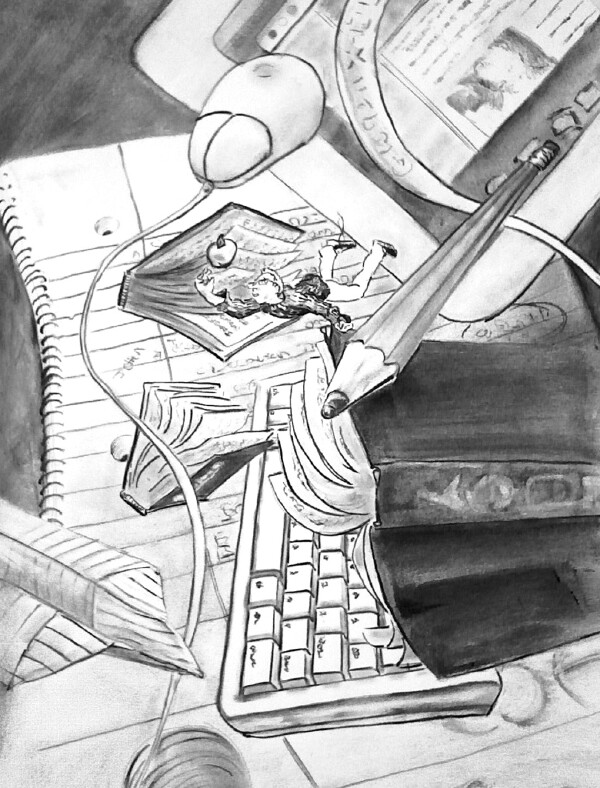Cram Session
sharing wisdom one can only acquire in the school of life
Mike Paulus, illustrated by Ian Kloster |

Greetings! This one goes out to all you students out there. And by “students,” I mean “those who learn.” And by “those who learn,” I mean “everyone, because life is a journey of constant education.” And by “constant education,” I mean “the relentless onslaught of mortifying experiences proving just how inept you really are at even the most basic tasks of living.”
Got all that?
Well, students, I hope you’ve been adjusting well to the new school year. You’ve probably got a good few weeks left until the crushing dread produced by your academic procrastination fully sets in, so while you’re living in blissful ignorance, allow me to posit a few intellectualistic points of interest from a real, live college graduate.
All this book learning you are doing is important. However, as many of my smart, good-looking peers will attest, one of the most important things a person can learn in school is how to learn. And some of the most important of life’s lessons come after graduation. Like what, you ask?
Here are some examples, broken down by curricular genre.
GRAMMAR & SPELLING
People, you look really dumb if you can’t spell basic words. And you look even dumber if you don’t take time to correct your typo-ridden emails and Facebook status updates. Trust me, I know. This is coming from a chronically poor speller and hasty email sender. I have sent emails to my wife which have been completely unintelligible. At work, I have needed to email bands and ask for their promo photos, only to ask a complete stranger to send me their prom pictures. These seemingly small things have large importance.
But you look dumberist if you misspell words and overlook typos when you’re trying to sound smart in an online debate. I don’t care if you’re arguing about health care, religion, fiscal policy, the Packers, or the newest World of Warcraft expansion pack. If you can’t spell, you loose lose.
This is why I no longer argue. About anything. Sort of. Not really.
MATHEMATICS
We all love joking about how high school math teachers should stop teaching kids to solve for the coefficient of the quadratic theorem of the radius of a parabolic triangle, and more time teaching kids how to solve real world math problems like doing your taxes, figuring out what you owe on a group restaurant tab, and impressing coworkers by doing basic multiplication in your head.
Jokes like this are funny because they are true.

PHYSICAL EDUCATION
Not important. Eat better. Exercise more. Next!
HISTORY
History is important. Especially when you need an example to back up an argument you are having about health care, religion, fiscal policy, the Packers, or the newest World of Warcraft expansion pack. Unfortunately, most history teachers possess an annoying insistence on padding noteworthy historical events with something called “historical context,” because it explains why people actually did what they did or said what they said.
However, it may be worth wading though the murky context of historical happenings to find the perfect support you need to back up your flimsy argument against recycling or something dumb like that.
Seriously, how can you argue against recycling? I’m going to need three main points, and introduction, a conclusion, a bibliography, and a cover sheet. And, like, show your work.
SHOP CLASS
At some point, you will need to know how to use tools. You wanna hang a picture? Bam. You need tools. You wanna replace your hot water heater? Bam. You gotta get some tools. You wanna fix a light fixture? Bam. Tools, tools, tools.
You wanna add an ejection seat to your car? You can’t. Too expensive.
Luckily, the tool-users of today possess the greatest tool man has ever invented: YouTube. Seriously, I replaced the whole damn computer system in my oven using nothing but a phillips head screwdriver and a video I found online. I saved hundreds of dollars and didn’t burn my house down. Awesome, right?
ART CLASS
You should take an art class. Yes, yes, the special kind of creative thinking and perspective-tweaking you practice in an art class is applicable to every part of your life, and it’s instrumental in today’s economy. But forget all that. Take an art history class. This will give you something to talk about when you are trying to impress potential mates of either sex at a bar. Pretty much anything can “remind you” of the work/methods/life story of painter or sculptor and make you sound smart and introspective and hot and sexy.
Trust me on this. You are reading something on the internet, so it must be true.




















